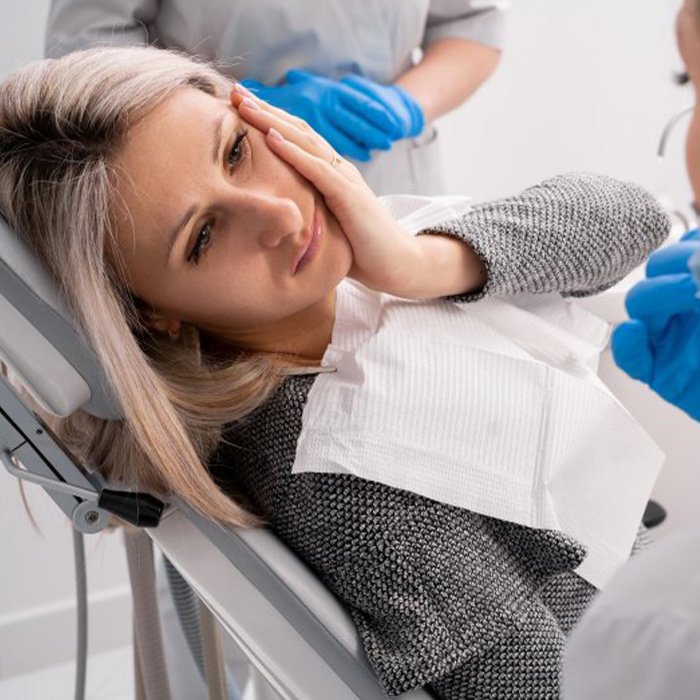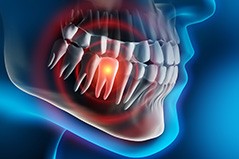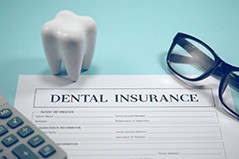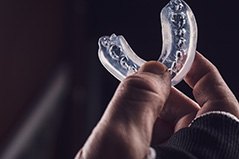Emergency Dentist – Plattsburgh, NY
Getting You the Help You Need Right Away
A knocked-out tooth, serious infection, cracked enamel, or lost dental crown are all examples of dental emergencies. Often occurring at the most inconvenient times, these injuries require the help of a trusted professional who can deliver timely treatment to avoid worsening symptoms. At True North Dental Group, our team of emergency dentists in Plattsburgh understands the need to provide immediate care for our established patients. We try our best toer same-day appointments and have emergency calls available to our doctors after-hours and on weekends. Give us a call if you need urgent assistance to treat a serious dental injury.
Why Choose True North Dental Group for Emergency Dentistry?
- Same-Day, After-Hours, and Weekend Emergency Appointments
- We’re In-Network with Delta Dental
- Caring and Compassionate Dentists and Dental Team
How We Treat Dental Emergencies

Several steps must be taken to ensure the successful treatment of a dental emergency. It starts with calling ourice to schedule an appointment. Our team members will work to get you in as soon as possible while alsoering helpful tips should you need help to manage any pain or swelling in the meantime.
Once you arrive at ourice, we will immediately escort you to a treatment room and take digital images of your smile. We’ll visually examine your mouth and attempt to pinpoint the problem area. Once all of our information is compiled, we will review our findings to deliver a personalized treatment plan that you can review. We’ll then begin to help you out of any pain before addressing the root cause of the problem.
The Most Common Dental Emergencies
Not all injuries are considered dental emergencies, but you should never feel as if you cannot contact ourice for help. If you want to know more about the types of situations we take care of in-house, review the information below and discover how you can take better care of your smile while waiting for your appointment.
Understanding the Cost of Emergency Dentistry

No one ever expects to experience a dental emergency, but one in six Americans will need to see an emergency dentist this year. Emergency dentistry is rumored to be very expensive, but don't let the worry about a large bill stand in the way of getting the care you need. Many things influence the cost of dental emergencies in Plattsburgh, but we offer the flexible financial solutions you need to rehabilitate your smile without costing you an arm or a leg.
Every Dental Emergency is Different

There's no flat fee for emergency dentistry because every situation differs. The amount you will pay will be determined by your treatment plan. Common solutions for dental emergencies often include:
- Root Canal Treatment
- Tooth Extraction
- TMJ Therapy
- Gum Disease Treatment
Your estimate may also include diagnostic services, like X-rays and other procedures to properly diagnose the issue to create an appropriate solution.
Does Dental Insurance Cover Dental Emergencies?

Most dental insurance plans will cover one emergency visit each year for a co-payment. Your benefits may also include 50% to 80% of the expenses for medically necessary services after meeting your annual deductible. You can use your annual allowance to lower the amount you will pay out-of-pocket for common services, like root canal therapy, tooth extractions, restorations, and much more. A member of our office will work on your behalf with your dental insurance to maximize your coverage to keep your treatment affordable. We will explain how your coverage is being used to pay for your treatment.
Other Options for Making Dental Emergencies Affordable

In addition to using your dental insurance, your emergency dentist in Plattsburgh offers several financial solutions. A member of our dental team will review your estimate, so you'll know exactly what you'll have to pay before committing to anything. They will also discuss your payment options, including:
- Traditional Payments: Our office accepts cash, personal checks, and most major credit cards for your convenience.
- Financing: Based on your credit approval, you can benefit from little or no interest in financing to make monthly installments for any out-of-pocket expenses.
- In-House Membership Plan: If you don't have dental insurance, you can benefit from discounted rates by joining our in-house membership plan.
Keys to Preventing Dental Emergencies

Acting quickly when you’ve had a dental emergency can save your smile. The longer you wait to be seen, the more likely you are to develop progressively worsening decay, disease, or other damage. Fortunately, our True North Dental Group team offers same-day appointments, so you don’t have to wait for relief.
Although we’re happy to help you through your emergency, you can avoid issues in the first place by taking the proper precautions to help your teeth and gums resist cavities, physical trauma, and periodontal problems. Continue reading to learn how to safeguard your smile to avoid an emergency, and feel free to contact us for more information.
Visit Your Dentist Regularly

Many people don’t think about their dentist unless they have an issue requiring professional intervention. However, one of the best ways to avoid this scenario to begin with is by scheduling a routine checkup and cleaning with our team every six months.
This allows us to monitor your oral condition to identify and treat any areas of concern, like weakening enamel or early gum disease, before they can progress. Plus, dental insurance plans typically fully cover standard visits, while more complex procedures are only partially included. That means it’s usually more cost-effective to invest in preventative care than waiting for something bad to happen to be seen.
Practice Consistent Oral Hygiene at Home

Our team can professionally clean your teeth at your appointments, but you must also implement a regular at-home dental hygiene routine to keep them healthy between visits to prevent dental emergencies.
Brushing and flossing twice daily removes plaque and buildup of bacteria that contribute to tooth decay and gum disease. Regularly scrubbing away harmful materials keeps your grin clean and clear so it can fight germs and resist cavities.
Eat Nutritious Foods

The ingredients you eat make a significant impact on your dental well-being. For instance, overly sugary or acidic foods can lead to decay and disease, making your teeth more vulnerable to injuries.
Choosing more wholesome options that support your grin can keep you out of the dentist’s chair. If you want strong teeth and bones, opt for dairy products like milk, yogurt, and cheese that contain calcium. Eating more leafy greens and citrus fruits can boost vitamin C and support your connective tissues.
Wear a Mouthguard

Athletes or those participating in team or high-contact activities risk sustaining injuries that could chip, crack, or dislodge their teeth. Thankfully, our team can provide a custom-fitted mouthguard for you to wear to absorb the impact if you take a blow to the face to protect them.
Also, if you suffer from bruxism (chronic teeth grinding), we can give you a nightguard to create a layer of cushion between your arches. This alleviates the pressure on your TMJ (temporomandibular joints) and keeps you from wearing down your enamel prematurely.
Don’t Use Your Teeth as Tools

If you’ve ever been tempted to quickly pop open a container or tear a package with your teeth, you’re not alone. However, they are intended to bite and chew food and help you enunciate words. They aren’t intended to function as tools, and using them this way can hurt them.
You can preserve your dental condition by taking a few extra moments to locate the right equipment, like scissors, a letter opener, or some other appropriate instrument for the task at hand.
Dental Emergency FAQs
Will a Toothache Go Away on Its Own?
Unfortunately, toothaches generally do not go away on their own. In fact, they usually end up getting worse the longer they’re left untreated. For this reason, we recommend you schedule an emergency appointment with us as soon as possible if you are experiencing one. Even if it’s nothing, it’s best to rule out any problems before they become more serious.
Some toothaches are caused by gum irritation located around the tooth and not inside it. These can clear up on their own; however, it is still best to get a professional opinion if you are experiencing any tooth-related pain.
Should I Visit the Emergency Room First for Dental Emergencies?
Unfortunately, most emergency rooms are not equipped to handle dental emergencies, nor do they typically have a dentist on staff. However, if you are experiencing any of the following problems, please head to your emergency room or call 911 as soon as possible:
- A fractured or dislocated jaw.
- A serious cut or laceration to your face or mouth.
- An abscess or infection that is swollen to the point that you cannot breathe or swallow.
For all other types of dental emergencies, please contact True North Dental Group for further assistance. We offer same-day, after-hours, and weekend emergency appointments as necessary.
Can I Pop a Dental Abscess on My Own?
No. Never under any circumstances should you ever attempt to pop a dental abscess on your own. Always contact your dentist as soon as possible, or if you are unable to breathe or swallow, head to your nearest emergency room.
Popping a dental abscess will only further expose your mouth to more bacteria and cause irritation in the infected site. Furthermore, delaying treatment can allow the infection to spread throughout the mouth, neck, throat, and head.
Should You Put a Knocked-Out Tooth in Water?
While you can rinse off a knocked-out tooth with water, never store it in a glass of water. This can damage the root surface cells of teeth and reduce the chances of it being saved.
Instead, try to keep it in your open socket in your mouth, or if not possible, place it in milk or saline solution for up to one hour if either is available.
I Need a Checkup & Cleaning I am Worried About Gum Disease I Have a Cavity or Broken Tooth I am Missing One or More Teeth I Want to Enhance My Smile I Want a Straighter Smile I'm Having Trouble Sleeping View Our Services
Get Answers.
